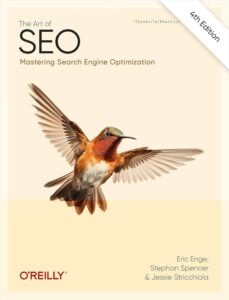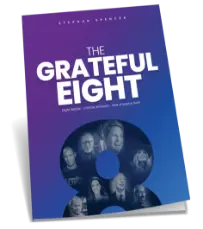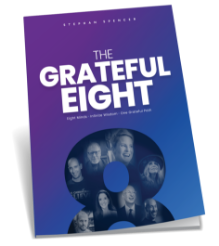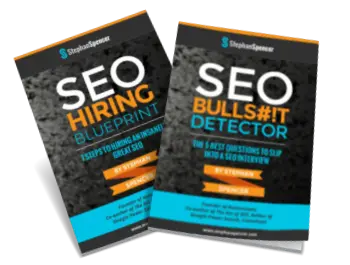Stephan Spencer at State of Search 2016
Welcome to The Loft for the final session in The Loft today. You guys are in for a treat. Stephan actually wrote the book on SEO. You can’t say that about too many people. For those who don’t know today, we have been talking about cool personal facts related to movies and TV instead of boring bios.
Stephan’s favorite TV show is Stargate: Atlantis, his favorite book is The Diamond Age, his favorite band is Everything But The Girl and his favorite movie is The Matrix. Here we go.
All right. Hey everybody. How are you doing? Yes. I love getting audience interaction. That’s awesome. Thank you.
What I’m going to go through is not just how to hire an awesome SEO but also an awesome employee or contractor in general because I think all of you could benefit by having some staff person that you can delegate to, right? Okay, so here we go.
You’ve heard that I kind of wrote the book on it, but I only co-wrote it. I do have some great co-authors. This is The Art of SEO, and this is my little book. I solo-authored this one called Google Power Search, which is how to find anything in Google.
Any SEO needs to know how to do power search tips and query operators that are kind of out of the ordinary. Right? That’s a really helpful one, and then finally, Social eCommerce, which is all about how to leverage social media for online sales. Who wants a copy of this book? Anyone? Like, who really wants a copy of this book? Like enough that they’ll come and get it. Like, seriously? You, okay, you get it.
And you’re, you’re just strolling over. Okay. Somebody could have moved and gotten a free book. Okay. Well, that chance is over with. Maybe you’ll get another chance. Now you’re done. You’re done. But if you tweet some awesome tweets, maybe the best tweet might get a free book.
Okay, question for you. Are you in the market to hire an SEO employee, contractor, or agency? Who’s looking for an employee? Okay, who’s looking for a contractor? Who’s looking for an agency? Okay, so the fewest for the agency. You’re in the right place, but you’ll all benefit. This is all going to be really beneficial because you can apply these steps to hiring any contractor, vendor, agency, part-timer, or full-timer; it doesn’t matter.
It’s a seven-step process. We’re going to start with getting the garden to weed itself. We get a lot of weeds coming and contacting us and saying, “Hey, we want your business, or we want you to hire us, right?” You put a job advert out, and a bunch of garbage inquiries are coming in. They didn’t even read the job advert.
It’s really irritating, right? Does anyone have that same problem? Yes. Okay. So we’re gonna get the garden to weed itself. And my little analogy here is the rock band Van Halen.
David Lee Roth had this really complicated contract that required, for example, M&Ms with all the brown M&Ms removed. If he got into his dressing room and there were brown M&Ms in the bowl, he’d be very upset.
You’d think, “Wow, what a prima donna, right?” No, it was actually very strategic because if in the contract they didn’t bother reading that fine print and following through on that, then there are probably lighting mistakes that they made because they, at the time, had the most complicated lighting setup of any rock band.
Someone could get really injured if it was not set up right. He’d find the brown M&Ms, and then he’d go check out the lighting. And sure enough, there’d be errors. There’d be screw-ups. We’re basically going to set up our candidates who are going to be seeing our job advert, the good ones to get through this process and the bad ones to weed themselves out of the process.
How do we do that? Well, we create a job posting that is so freaking genius. I have to high-five myself, right? It’s awesome. Here’s what we’re going to do. We’re going to, for example, create a riddle. We’re going to tell them to voicemail us instead of email us. Why would we have them send us a voicemail or leave a voicemail?
Well, there’s multiple reasons. One is that they’re probably not going to follow directions, and we don’t want them. If they can’t even follow directions in the initial state while they’re trying to impress us, imagine what happens after they’ve secured the position. And the cost is just crazy expensive for a wrong hire.
What is it, a year and a half of their salary or something like that? It’s not good, right? We want to avoid that pain by doing our homework upfront. And making them jump through some hoops. Does this make sense? Alright, what are we going to ask for in the job effort? We’re going to ask them to leave us a voicemail.
And what can we tell from that voicemail, assuming that they followed directions? If they didn’t, they’re out. If they emailed us instead, they’re out. But if they did leave us a voicemail, let’s say there is a lot of noise in the background. You know, screaming kids, or construction, or whatever.
Filtering Candidates the process of separating quality candidates from noise.
Unprofessional or not thought through kind of voicemails like that. They’re out. It’s not that we’re discriminating against people who have kids. It’s that they didn’t take the time to think through what the first impression was going to be. And no, they’re out. What else are we going to check for? Did they leave a phone number for us to return it to?
Do they actually think through this stuff? Like real-world smarts, street smarts. That makes sense, right? Also, if they left a very long, rambling voicemail, that’s not good either. These are really easy things to check for. What do we do with the riddle? Let me jump to this slide with a riddle: We want to see their problem-solving expertise.
We don’t want it to be easily Googleable, but frankly, I don’t care if they got the answer wrong in the riddle. One example of a riddle might be, there’s a policeman, a child, and a convict; they’re all trying to cross the river, and you can’t leave the convict alone with, or you can’t leave the convict alone at all, you can’t leave him with the child, etc.
And then there’s the boat, which only takes two people at a time. How do you get all three across the river? That’s an easily Googleable answer. Come up with some weird permutation of that. Right? There’s a frog, and then there’s a scorpion, and then there’s a child, and they’re all trying to, whatever, you know?
Figure out something that is not easily Googleable that they have to do that thought process with, and then have them show their work. Most of the time, people will not follow the directions, and it’s super frustrating for the person who screens all the candidates to go through all this and see all these people who didn’t follow directions.
But we care about attention to detail, right? SEOs need to be very detail-oriented. What do we do now? I don’t like doing that screening process, so I delegate it. I have a team of virtual assistants, and I have different places where I advertise, including Craigslist. Surprisingly, Craigslist can bring you great candidates if you have a killer ad.
I put ad words out into different cities. I prefer cities that are college towns. You do have to pay the money to post the ad. In smaller cities, you don’t have to pay a fee, but in larger cities, you do with Craigslist. I’m happy to pay the fee and not have so much noise.
Another thing, too, is the signal-to-noise ratio. You want it to be really high. Does that all make sense so far? When we get these high signal-to-noise ratios, all these people are out because they didn’t follow the directions, show their work, or put this thought into the job application process.
It’s fantastic for us because we don’t have to waste our time with a whole bunch of first interviews. And by the way, I don’t even do my own first interviews. I have my assistant do the first interview. We’ll get to the first interview in just a minute. Delegate the screening. You could have a test assignment instead of a riddle.
What would be an example of a test assignment? This is an actual question I’m asking you. Audience participation time. What is it?
Audit a website
Perfect. What exactly would you have them do? If this is going to be a screening question, right? Or something that you’re going to? We don’t want them to be overwhelmed, right?
We don’t want to say, go through and audit all these different things. Let’s break it down a bit. Let’s make it a little less onerous than auditing a website. What would you have them audit on the website? What do you think?
Content issues.
Content issues. Okay, let’s get even more specific.
Let’s say we’re having technical issues with page speed, like auditing the page speed. Show me what the page speed issues are with this site. That’s easy. Just pull up page speed insights. How about mobile issues? Show me that this is mobile-friendly, right? What do you think about content issues?
Perfect. Duplicate content, right? Maybe they would need access to Google Search Console to see duplicate titles and meta descriptions. Maybe they could run Screaming Frog and show you what they found with that—different ways of giving them little hints.
Test assignments will be easy jobs to do. Another thing you can give them is to check the cache date, page authority, domain authority, citation flow, and trust flow. You could have them check for the last modified date, other HTTP headers and things like that. Right? Cool.
And then what if you tell them the right answer after they got it wrong, and they defend their wrong answer? What do you think about that?
This is a huge red flag. If they try to defend their wrong answer, do not hire them. Please do not hire them. If you hire them, please come to me and tell me I was right after six months, and it was very costly so that we can put that out as a case study. It would be a really bad idea to hire somebody who defends the wrong answer.
Step two. We’re going to review their social media profiles. Now remember, back to the job advert, and let’s say I’m posting it on Craigslist, LinkedIn, or elsewhere, right? If I’ve asked them to supply me at least one or a couple of different social URLs for social profiles, they manage.
I don’t even care if they’re their own. I don’t care. They could be their companies, clients or whatever. I want to see evidence that they get the internet. And if it is one of their own social profiles, then I get a real insight into how they think, whether they are putting up a good face right now, but like if I went back in their Twitter stream a year or two years ago, did they do really stupid stuff that they really should have or cleaned up and deleted?
This is stuff that you need to think about as you analyze what they’ve submitted to you in terms of their social profiles. Here are some questions I look at, and I invite you to consider as you evaluate these people’s social profiles. For example, are they being discriminatory or derogatory towards other people in the industry? That’s a red flag.
Are they actively asking SEO questions, or is SEO just not on the radar on their social profiles? What kind of content are they sharing? Is it really high-value stuff? Do they seem to be really good at curating? Or is it just this obvious stuff that everybody else sees on the front page of search engine land?
For all of these social media questions, I invite you to grab the PowerPoint. Are these PowerPoints being made available?
Yes.
Grab the PowerPoint. You don’t need to take copious notes of every bullet point. The idea is that you’re not just looking out to see if they get the internet, but are they good people, too? But be careful. If you are being discriminatory, or it could be misinterpreted as you being discriminatory, that’s a big danger area.
Step three: Use A-B split tests on your job efforts. You think, “Okay, I test my ad copy for my clients. Why wouldn’t I test the ad copy for my job adverts to hire people?” Of course, you would. Test your title, your calls to action, the various bullet points, the roles and responsibilities and all that sort of stuff.
Test all that. For example, I used Wicked Smart as part of the adjective in the title of one of the jobs I was putting out an ad for. I used this in Boston, and it made perfect sense to say Wicked Smart. And I did get some cool people applying for the job that they applied for because they loved that it was for WickedSmart marketing assistant or whatever, right?
That was cool, but then I tested using Geeky instead of WickedSmart, and it actually pulled in better candidates. I wouldn’t have known that if I hadn’t been doing testing. Test this stuff just like you test your search advertising and your SEO.
And is there anything else I want to say there? Test different outlets, too. Different places where you want to post your app. For example, let’s say you’re looking for a content creator. There are sites for writers, like ProBlogger, which has a job board. Are there any other favorite sites that you guys like to find writers on?
Does anyone want to share their secrets? That’s just one example if you’re looking for a virtual assistant. You can actually find some really great folks in the Philippines for a very cost-effective rate. You can find full-time people for maybe 800 a month and part-time people for maybe 400.
There’s a site called OnLineJobs. ph. Does anyone use OnlineJobs? No? Who knew about OnlineJobs.ph? It’s basically Monster.com for the Philippines. There you go, that’s a great tip. Right there, and if you don’t want to go through the effort and you want to have basically a headhunter in the Philippines, there’s a service called Virtual Staff Finder.
Chris Ducker is the founder of Virtual Staff Finder. There you go. Virtual Freedom, which is a great book. Has anyone heard of Virtual Staff Finder? Or how about Chris Ducker? It’s a great book, Virtual Freedom. And just a little tip from that book: it encourages you to create your three lists of freedom.
What are the three lists of freedom? It’s just, what do I not like doing? What am I not good at? And I don’t want to do it. I’m not good at it, and it just escaped me, but it talks about those three lists of freedom in the book. And after you’ve done that exercise, you’re supposed to delegate all the stuff that’s on those three lists to virtual assistants or other teammates. It’s a great process.
How many minutes do I have left here? I want to run out of time.
Step four is using trick questions in the interview process. What sort of trick questions? Now, this is not to trick the qualified candidate. This is to trick the posers and the charlatans. People who say that they know SEO, but they don’t. Alright, here’s what you’re going to do.
If they can’t even follow directions… imagine what happens after they’ve secured the position.
Because in the first interview, we’re not going to bring in an SEO expert to screen these people. It’s too costly, time, resources, and money to do that. But in the first interview, and remember, I have my assistant do the first interview. My question for you is, what are some trick questions that you might use in your first interview?
How much does it cost to get to the first organic ranking of Google?
How much does it cost?
To get to the first organic ranking.
First organic ranking of Google. Thank you for that question. I’m thinking maybe something that there’s like only one right answer for. Let me give you an example.
Tell me your process for optimizing meta keywords. What’s the only right answer that doesn’t? In fact, I want them to say that meta keywords never count in Google. I don’t want them to; I want to lead them on. Please elaborate. What do you mean by don’t? It’s like they don’t count as much as they used to.
They never counted in Google. Google went on record to say this back in 2009 on this Google Webmaster Central blog. We just have never counted meta keywords as a positive ranking signal. If they say anything other than that, what are you talking about? They never counted. This is a trick question. There’s only one right answer. Any other thoughts on trick questions?
How long does it take to rank?
How long does it take to rank? What would be the only right answer for that? It depends. That’s a mad-cut answer. That’s not quite the trick question. Let me give you a few other ones. How much influence does a meta description have on rankings?
There’s only one right answer, and there’s zero influence. It only influences the click-through rate. What’s the difference between Panda and Penguin? If they get that wrong, Panda is all about lengths, and Penguin is all about thin content. It’s the other way they’re out.
Here’s a cool one. What do you think is most important? Attention to detail, honesty, creativity, integrity, dependability or dedication, technical acumen. Which one? That’s my question for you. Which of those do you think is the most important?
Technical acumen for hiring an SEO? If you were in the interview, what would you say? Technical acumen? Attention to detail? Honesty. And dedication.
Only about 20%, maybe 25 percent of you said honesty, and that’s the only right answer. This is called the honesty test. It is so freaking awesome.
Because if you hire somebody who’s all about attention to detail, and they’re not honest, if that’s not in their highest values, you are going to be screwed. You’re screwed. That’s worth the price of admission right there, that one tip. That’s called the honesty test. I have a bunch of these trick questions, a handful of them actually, in this SEO BS Detector free PDF download, which you can get by texting the word DFWSCM to 33444.
I’m going to get you on my list. But it’s really valuable. Not only does it give you those trick questions, but it explains how basically anybody who doesn’t have to know SEO can get the right answer from these people, these candidates. And then you bring in the big guns, the SEO experts, to do the second interview or to assist you with the second interview.
Did everybody get that? 33444. And put the word D-F-W-S-E-O.
Step five: ask specific questions that prove expertise.
Here’s a question for you. What’s your wellspring? And you’re like, “What the heck is that?” See, these are the kinds of questions that you’re going to ask in the interview that are going to prove their expertise. And you’re going to ask for specifics. Evidence of their expertise. What’s your wellspring?
What are you best at? And then what’s your quicksand? What do you suck at? Because asking them about their weaknesses is not helpful. They’ve got some rehearsed reply to that that’s of no value to you. And it just sets them up. Don’t even ask that. Ask them for their quicksand.
We’re going to ask them for specifics, like, not just, “Okay, tell me about some of the SEO tools that you use, or tell me about your favorite SEO tools,” which is a great question. It allows me to probe, and because I know a lot of SEO tools, I did a second interview for a client, which was pretty funny.
The guy said Majestic SEO was his favorite SEO tool, and he gave a few others. And I just asked a probing question about it, “Well, tell me about Majestic SEO.” First of all, the red flag had already gone up because it’s now called Majestic. And I asked him, “What’s that metric in Majestic SEO?” “That, you know, measures importance or whatever.”
And he’s like, AC rank. He just blew it because AC rank was deprecated years ago and replaced by citation flow and trust flow. If this is his favorite SEO tool and he has not been using it for a couple of years, he’s not a real SEO. I was polite, and we continued in the interview; I didn’t just like cut him off, but he was out at that point.
Get specifics, and when you’re developing an opinion about somebody, ask for contrary evidence. This person seems really lazy like they’re going to cut corners. Ask for contrary evidence. For example, “Tell me about a time when you were so focused on getting the goal that you went through all of the steps and did everything possible, like you didn’t miss a single detail, and you were less driven to get the result.”
Give me an example of that. And have them kind of walk you through a situation and also keep your mouth shut because the person who talks the most in the interview, you loses the person who talks in the interview the most loses.
You need to be the person who wins that interview. And the candidate is trying; if they’re smart, they’re trying to get you to do most of the talking. But no, they’ve got to do 80 percent of the talking. Ask them about their link-building philosophy, like tell me about how you reach out and what you would say to an influencer that you’re sending an email to. You know, it’s a cold contact, and I’ve never spoken to them before.
What kind of outreach campaigns are you doing for clients, etc? Give me some specific examples, and tell me about some successes and failures. Ask them how they learn, what their favorite websites are for getting trained on SEO, keeping up with the industry news, and so forth. If they’re unable to list a bunch of blogs, they’re following or resources where they got online training or conferences that they went to.
Step six is the second interview. Now, you can bring in an expert and have him or her do the second interviews or assist with them. That’s really powerful. Finally, step seven is to confirm the fit during the interview process, or I mean during the trial period.
Don’t ask about weaknesses. Ask for their “quicksand.”
If you hire somebody and the barrier to getting rid of them is low, you’re not hiring them immediately as a full-time employee; you give them some trial assignments, a two-week trial period or whatever, a trial project to work on before you commit to a long-term arrangement, and you’re going to be in better shape.
Because people might interview really well, but then they suck at the actual doing the work process. Do you pay them during that trial period? Yeah, you absolutely pay them during the trial period. I have somebody in the trial period right now, as a content writer for me, and we just gave her a couple of trial assignments to work on, and we’re paying her the rate that she had asked for.
Almost the rate that she asked for. And don’t train them yet because you don’t want to invest time in training somebody. And by the way, if you do give training to a new employee, which I’m assuming you’re going to, who does that, who’s training their new employees, every single one of you needs to record those because that goes into your content library or training library.
Let me teach you how to get featured snippets and what we need to do. Let me teach you about using Majestic and what that scatter graph means in the diagonal when you’re trying to get above the diagonal, especially where it matters over here and everything. If you have a virtual person that you bring in over video, such as Skype or GoToMeeting, it’s super easy to hit record.
You know, just use a call recorder, for Skype or GoToMeeting has recording capabilities. Or if you’re doing it in person, you’ve got a Mevo camera or something that’s recording it. So you have this captured and goes into your training library. And then, um, ask for their primary advantage or have them take a test.
The Fascination Test, which was done by Sally Hogshead, is awesome. You’ll find out the person’s primary and secondary advantages and archetype. This is how the world sees them, not how they see the world. Then, there are other personality tests on how they see the world, such as the DISC and Predictive Index.
DISC, I love it. You can just send them to TonyRobbins.com; I forgot the URL. And they take it for free. The DISC assessment normally costs hundreds of dollars. And they can take it there for free, and then you just have them send you the PDF report of all of the stuff, and you can find out how dominant they are, how outgoing they are, how attentive to detail they are through that personality test, and I don’t have everybody do that, just the people that I’ve brought on on the trial period.
The last point here is to match up their values to their roles, right? Have them do a Demartini Values Determination. Then they send you the report showing their highest values. Let’s say it’s family, let’s say it’s their religion, let’s say it’s their kids or whatever, and figure out ways to match the job duties.
You’ll be overwhelmed. Okay? Then, we get into the 10-minute written verification. This is the 10-minute written verification if you have a trusted technology with just at first. You come up, and you get a book, and we’re good. Again, if you want the PDF, DFWSEM is the word-to-text to 33444.
I’m Stephan Spencer. Thank you very much.
Alright, we’ve got to hustle because the note starts in less than six minutes. Seven minutes down in the main room. We left the preparatory keynote before the main keynote. Everybody heads downstairs. Thank you.






